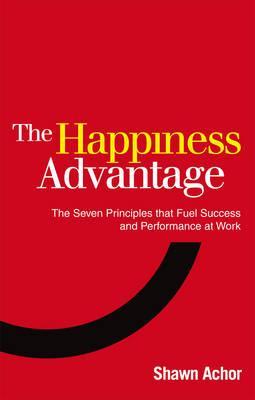 Every Friday, I’ll be recommending a book which I’ve found personally meaningful on my own motivation journey. And, honestly, there’s only one book that I could begin with. I’ve plugged it on pretty much every podcast, article and presentation that I’ve ever given: Shawn Achor’s book The Happiness Advantage literally changed my life. I discovered it when I was at a low-point in my personal and professional life, and it made me realise that I’d been doing everything in my life back-to-front.
Every Friday, I’ll be recommending a book which I’ve found personally meaningful on my own motivation journey. And, honestly, there’s only one book that I could begin with. I’ve plugged it on pretty much every podcast, article and presentation that I’ve ever given: Shawn Achor’s book The Happiness Advantage literally changed my life. I discovered it when I was at a low-point in my personal and professional life, and it made me realise that I’d been doing everything in my life back-to-front.
Shawn also gave my all-time favourite TED talk, embedded below, which is a good primer on the subject and one of the funniest, most revelatory ten minutes that you’ll see on YouTube.
So what is it about The Happiness Advantage which made it my first choice to recommend?
We need to reverse the formula
We spend so much of our lives chasing success (particularly in our careers) in the hopes that it will lead to more money, and more happiness. Yet evidence shows that when we succeed, we simply move the goalposts in our heads: we look towards the next success, while all the time true happiness eludes us just beyond the horizon.
Shawn points to studies which demonstrate that we need to “reverse the formula”: people who are happier are prone to achieving greater success. It’s happiness that we should seek out, and the successes should follow.
The Happiness Advantage contains 200 pages of tips on how to build your own stock of happiness. Some of these are practical - for instance, performing charitable actions, or writing an email of thanks to a friend/colleague each day. Others are more psychological, such as learning to spot the signs of a “Tetris Effect” (when a succession of small negative events can have a spiralling effect on your emotions).
Extraordinarily, as late as 1998, there was a 17-to-1 negative-to-positive ratio of research in the field of psychology. In other words, for every one study about happiness and thriving there were 17 studies on depression and disorder. This is very telling. As a society, we know very well how to be unwell and miserable and so little about how to thrive […] This focus on the negative tricks our brains into believing that this sorry ratio is reality, that most of life is negative.
Destroying unchecked negativity
Sometimes in our careers (particularly in my chosen realm of testing and quality assurance), we’re primed to think negatively: Can we find any problems which will prevent us from shipping our products? What’s the worst that could happen? Why shouldn’t we hire this person? A healthy critical outlook is important; after all, traits such as caution, pessimism and fear have survived through human evolution because they’ve been vital for our survival. For instance, fear tells us that it’s probably not a great idea to jump into a lion’s enclosure.
However, longer-term this can be damaging as our brains become attuned to pick out the negativity in the world around us. We’ve all raged at a traffic jam, or at that person at the self-service checkout who’s got too many items and half of them need tags removing and OH MY GOD what is he doing?! Such “unchecked negativity” often results in our destructive emotions being forced onto other people: you cut someone else off in traffic, because somebody cut you off earlier. Or you’re snippy with the cashier because you’ve been waiting for ten minutes, even though she’s spent the whole day dealing with people who have been equally snippy.
In short, train yourself to avoid random negative outbursts and you’ll be able to fill the gaps with more rewarding bouts of positivity.
Make small changes every day
None of Shawn’s tips ask for you to reinvent yourself as a person, or necessarily even put in that much effort: we just change our lens on the world. Shawn talks about facing down challenges by creating a “Zorro Circle”: focusing on small, manageable goals to help us regain control of our situation, and gradually expanding our circle to achieve bigger goals. Giving frequent praise and recognition, for instance, is a small act which benefits others as well as yourself; it’s an example of “Social Investment”, where our actions towards those around us help to strengthen our support network for when times get hard. And, to bring us back to where we started, this is critical in our workplaces too:
Unfortunately, in today’s harried and fast-paced workplace, far too few leaders put in the time required to forge strong bonds with either their colleagues or their employees. […] Many leaders simply refuse to put in the effort, and the reasons are many and varied: not enough hours in the day, a fear of undermining their authority by getting too close to those they manage, a perpetual crisis-mode mindset (The woods are on fire! The sky is falling!), and even the simple belief that work is for work, not friendship. And yet the more they ignore the power of social investment, the more they undermine both their company’s performance and their own.
When it comes to The Happiness Advantage, I heartily recommend getting a copy, cherishing it, and then talking about it to everybody who’ll listen.
Key takeaways 📝
- We spend our lives “chasing happiness” in ways which ensure that we will never reach that point.
- Fostering our own wellbeing has a ripple effect which benefits those in your surrounding circle.
- Recognising unhealthy negativity is a critical first step.

